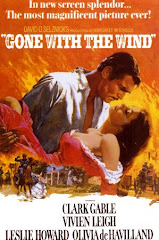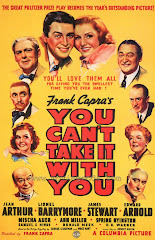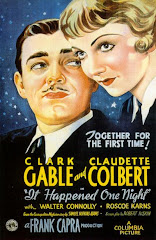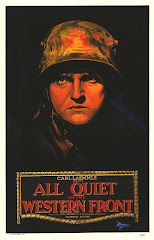Director: Fred Zinnemann
Cast: Burt Lancaster, Montgomery Clift, Deborah Kerr, Donna Reed, Frank Sinatra, Ernest Borgnine
Genre: Drama/Romance/War
Other Nominees: Julius Caesar, The Robe, Roman Holiday, Shane
Genre: Drama/Romance/War
Other Nominees: Julius Caesar, The Robe, Roman Holiday, Shane
From Here to Eternity is a film about the sacrifice demanded by a military life. The interesting thing is that these sacrifices are not the ones we typically expect from military films, as the majority of this film takes place in peacetime. It is the summer and fall just before the surprise Japanese attack on Pearl Harbor in 1941, and the film takes place on a Hawaiian barracks where three military men suffer for the army, and appear to get nothing in return.
Robert E. Lee Prewitt (Montgomery Clift) is a new transfer to the barracks, and both an excellent bugler and boxer. Upon his arrival he finds that the brutal base commander pulled some strings to have him transferred there as it is his personal wish to build a championship boxing team at the base, an achievement which the commander sees leading him directly to promotion. But Prewitt refuses to fight for the commander, eventually revealing details of a tragedy that prevents him from entering the ring. The commander is not impressed by these details:
You might as well say 'stop war' because one man got killed. Our fighting program is the best morale builder we have.
In response to his refusal to fight Prewitt receives “The Treatment”, an onslaught of abuse, both physical and mental, from some of the higher ranking officers at the base, most of them belonging to the boxing team. In one scene we see him dig a six foot grave to bury a newspaper, before being asked to fill it back in. Scene after scene of forced marches up the side of mountains, running laps of the fields in full gear, and other punishments are seen, all of them unjust punishments for a man who just wants to be a soldier. But even as the severity of the punishments and the pressure to submit to the commanders wishes increases, Prewitt insists on being his own man and refuses to give in:
I know where I stand. A man don't go his own way, he's nothin'.
On his first day at the base Prewitt meets Private Angelo Maggio and the two quickly become friends (Frank Sinatra won a Best Supporting Actor award for this role, considered his comeback role after a string of unsuccessful movies in the 1940’s). Maggio, on numerous occasions, defends Prewitt’s decision not to box and as a result of his support often ends up sharing the punishment being heaped onto his friend. But Maggio’s sacrifice ultimately stems from his own battle against corruption, centered on the malicious stockade sergeant "Fatso" Judson (Ernest Borgnine).
From the beginning “Fatso” had taken a disliking to Maggio and after a number of altercations between the two shouts a warning that guys like Maggio sooner or later end up in the stockade and under his jurisdiction. When that very scenario presents itself the sergeant unleashes all of his pent up frustration and anger on Maggio, brutally beating him where marks will not show, knowing that the pride of the young soldier will prevent him making complaints. Maggio’s death at the hands of the warden begins a chain of violence that escalates until it is interrupted by the Japanese attack.
The third example of personal sacrifice is seen in First Sergeant Milton Warden (Burt Lancaster). Disillusioned by operations at the base and at reporting directly to the corrupt base commander, Warden seeks the affection of the commander’s wife Karen, a crime that is punishable by up to twenty years in army prison. The wife has a promiscuous reputation on the base that, once the affair begins, creates a lot of tension. It is clear, even as the two bicker, that at the root of the affair are very strong feelings for each other. The most famous scene in From Here to Eternity, one that has been parodied again and again in film (my favorite parody being Airplane!) is the love making scene on the sandy Oahu beach. This scene was incredibly torrid for its day and remains one of the more erotic scenes in Hollywood history.
Another love story begins to gain momentum as the movie progresses towards that fateful day at Pearl Harbor. This is between Prewitt and a hostess (or prostitute) at a local gentleman’s club. Attracted to each other mostly because of the intense loneliness of their lives, the relationship struggles to gain traction, the nature of both of their careers being the biggest problems. Prewitt is understandably jealous when it comes to Alma’s work while Alma is seeking a man of higher social standing to help her climb out of her current life.
Both relationships play out and result in talk of marriage. And both prospects of marriage or a future together are dashed by the men’s love for the military. It is especially difficult for Alma to understand Prewitt’s love for the army, an institution that not only abuses him on a daily basis, but that is responsible for the death of his best friend. Prewitt tries to explain to her that even after all those things he does not hate the army, that the military was and is all he has got in this life, and that when "A man loves a thing. That don't mean it's gotta love him back".
With Warden there comes a clear opportunity to progress in his relationship with Karen and choose the woman he loves over his love for the army. It would require him to become and officer, take a desk job, and leave the barracks and in the end he cannot do it. Warden is not being selfish when he chooses not to be an officer. Although he knows that the job is not for him I believe that he would still do it to be with Karen. Instead he is sacrificing his passion and happiness for the army because he knows that he will make a poor officer and as a poor officer he would not be giving his best to the army. And this reasoning is after years of seeing injustice and brutality performed by the very institution he loves. Karen is understandably devastated but manages to say what the reality is:
You just don't want to marry me. You're already married - to the Army.
The true test of the men’s heroic dedication to the army comes when the attack on Pearl Harbor begins. At the time of the attack Prewitt is AWOL and in hiding. Suddenly, whatever negativity he is feeling is replaced with pride for the military. Rushing to confront the invaders as a proud soldier, he shouts “Who do they think they're fighting? They're pickin' trouble with the best Army in the world.” Warden, having sacrificed a better life and the potential for love and happiness, leads the men in the defense of the barracks, the attack solidifying him as the soldier he is. Both men have chosen to let their devotion to the army shape their destinies.
War is the sacrifice of human life and of human spirit but From Here to Eternity deals with sacrifices that occur primarily in peacetime. During this time we see prostitution, adultery, military injustice, corruption and violence, alcohol abuse, and murder. While the last moments of the film cover the barracks heroic reacting the invasion, by then the sacrifices have already been made, and the blood has already been spilled. Even sadder is the moment that you realize the characters who survived to make it to the battle are about to be dragged into a horrifying endeavor, one that will demand even more sacrifice than they have already given and that we have just watched them give.
Next Up: On The Waterfront



















































Have you read the novel?? If so what did you think? I finished it recently and didn't actually like it.. Unfortunately I haven't seen the film. What I do know is the film is miles away from the book. I didn't actually like the book and believe the film is more popular.
ReplyDeleteFrom here to Eternity is part of a trilogy and I think the next two books were far better. The Thin Red line was made into a movie as I'msure your'e aware, and wasn't anything like the book!!
Good blog and have only just stumbled across it!
@BRENT I have not read the book. I was not aware that it was a trilogy either. I enjoyed this film but I cannot say that I loved it so I do not think I will be running out to read the book! I would recommend seeing From Here to Eternity because of the legacy it left behind, and because it is a film that people should see. However, I am not sure I would recommend seeing it a second time.
ReplyDeleteThanks for your comment.
As a big Francis Albert fan he was never better, love the idea and execution of the blog.
ReplyDelete